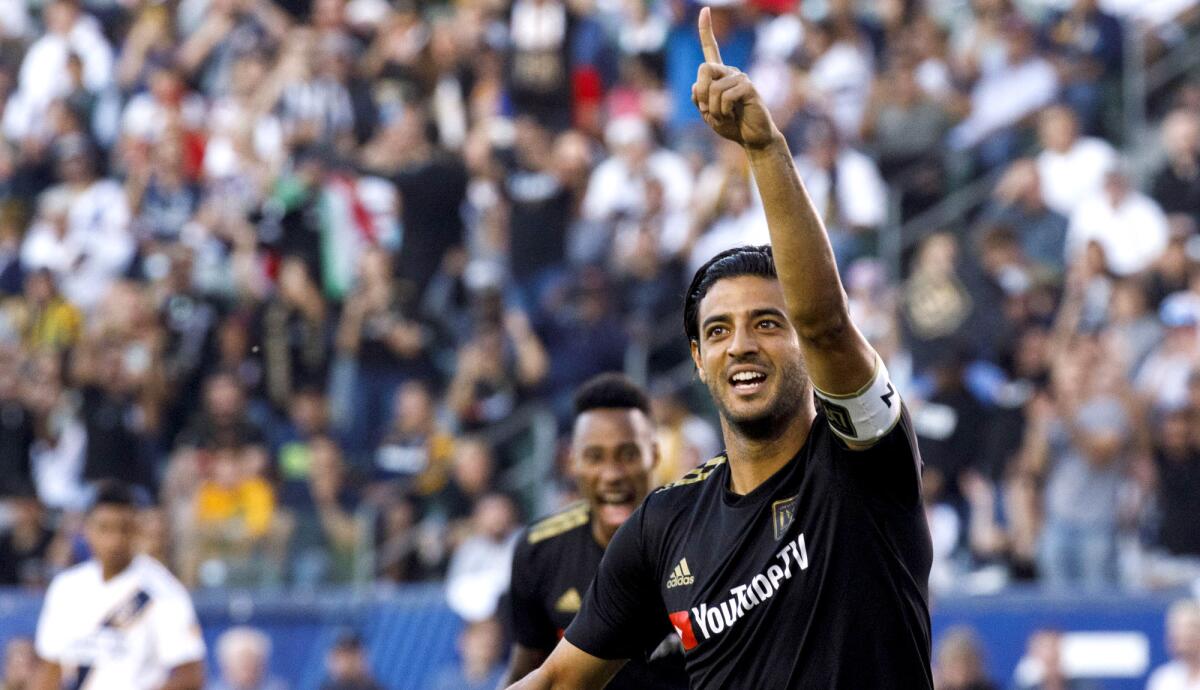MLS will allow Galaxy, LAFC to decide ticket refund policies

Major League Soccer said Tuesday it will allow individual teams to decide when and how to refund tickets for games affected by the COVID-19 shutdown, leaving the Galaxy and LAFC to work out their own responses to fans who want their money back and others who are keeping their fingers crossed in hopes the season will resume.
MLS, which suspended its 25th anniversary season on March 12 after two games, has pushed back its tentative restart date three times. The latest target is June 8.
The Galaxy deferred season-ticket payments in March, shortly after the season was suspended, and spread that money out over the remaining 2020 installments. It gave season-ticket holders the chance to do the same in April but has not offered blanket refunds since no games have been canceled.
“We’re still deciding what our plan will be for the month of May,” said Brendan Hannan, the team’s vicepresident for marketing and communications. “We want to do what’s best for our fans and our members. It is something that we’re discussing and hoping to roll out by the end of the week or early next week.”
Hannan said refunds for games that have been affected but not canceled — the Galaxy have had three home games postponed since MLS shut down — would be considered on a case-by-case basis as would requests from season-ticket holders whose financial situation has been adversely affected by the coronavirus.
In the meantime, the team said in a letter to season-ticket holders, “All tickets for postponed games remain valid and will be reactivated when games are rescheduled.”
LAFC, which has played two home games and had two others postponed, told season-ticket-holders last week that they will receive a credit toward future tickets or a refund of the price of the ticket for each home game not played before fans.
In a letter to fans, the team wrote: “If a 2020 LAFC match scheduled at Banc of California Stadium is officially canceled or will be played without spectators, we will notify you of the cancellation and then automatically apply your credit to your membership for the 2021 season. If you need other accommodations, contact us and we will work with you to find an appropriate solution, such as providing a refund for the value of the canceled matches.”
Major League Baseball announced Tuesday it will allow individual teams to work out ways to refund fans for tickets to games affected by COVID-19 but unlike MLS, which continues to say publicly it intends to play a full schedule, baseball has already called off more than 400 games. For MLS teams, holding on to that money is not insignificant since ticket sales are a leading source of revenue, with the home team keeping 67% of game receipts with the other third going into a pooled account shared by the rest of MLS.
Baseball’s greatest source of income is the combined national and local broadcast rights, which the league would receive even if televised games were played without fans.
“Our goal is to play as many matches as possible and mathematically, we can still play all the matches,” said an MLS executive who was not authorized to publicly discuss the league’s ticketing policy. “If any matches are officially canceled or played without fans, you can apply for credit to your account. And if the best solution for you is not a credit, you can get a refund for the value of those canceled matches.
“It’s a difficult time. We’re trying to support our fans in any way that we can.”
But the executive added, “We don’t have a leaguewide policy.”
Team presidents and chief ticketing officers from MLS have been meeting in videoconferences several times a week to discuss their options should games be canceled or scheduled behind closed doors. Also complicating efforts at finding a leaguewide response is the fact MLS has teams in 17 states and three Canadian provinces, many of whom have adopted differing policies regarding the spread of COVID-19.







